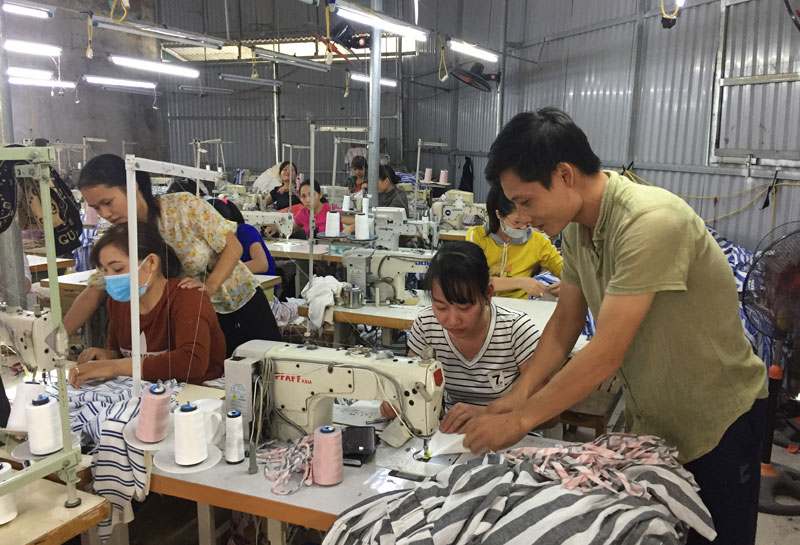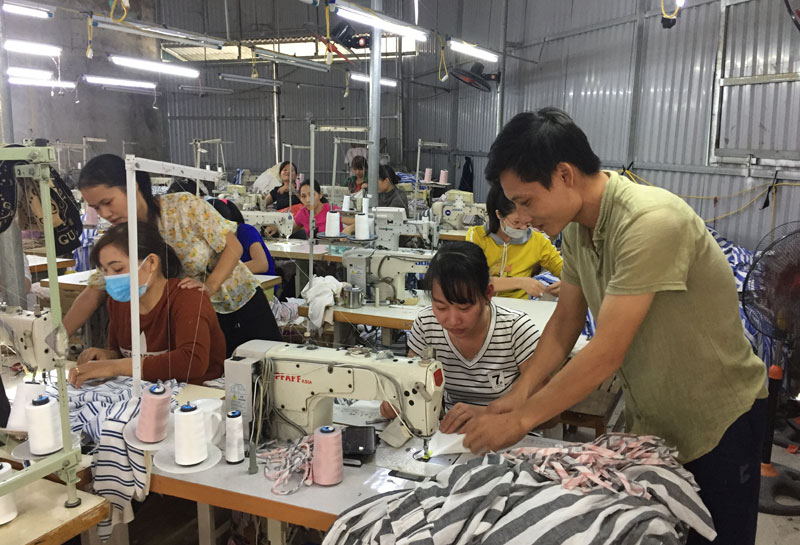
(HBO) - Due to his hard work to learn and explore, Mr. Dinh Thanh Han in Dong Mai village, Yen Tri commune (Yen Thuy) has succeeded in the model of a garment factory to process clothes. Thereby, it can increase the family income, creating stable jobs for many local workers.
In 2016, he invested in 5 sewing machines,
hired garment workers to receive clothes for processing at home, and he had to
hire a person in charge of the technical issues to ensure the development and
expansion of the sewing factory.

Mr. Dinh Thanh Han in Dong Mai village, Yen
Tri commune (Yen Thuy) wholeheartedly instructed workers on sewing techniques.
Thanks to his will to rise and achieve, up to
now, the area of Mr. Han's sewing factory has been expanded to 300 m2 with
about 70 sewing machines. Those are together equipped with the system of
extractor machines, stamping buttons, steam irons, fully equipped extractor
machines. Currently, Mr. Han's tailoring factory produces in an assembly line,
whereby each worker is in charge of one stage to create each product. On
average, there are about 18,000 products per month, however, the number can
increase or decrease depending on the difficulty of orders. The market is
mainly domestic and exported to the US, China, etc. In 2018, Mr. Han's family
reached 400 million VND of the profit.
Mr. Han added that one of the difficulties
when developing a garment factory is the capital. Currently, the cost of
operating the garment factory of Mr. Han's family fluctuates around 40 million
VND / month, not including salaries and bonuses for employees. In addition,
unpaid after-sales orders also make it difficult to delay the employee payment
and receive more subsequent orders. Besides, the garment factory has been put
into operation since 2016, most of the workers are weak in technique and
aesthetics. Therefore, the experienced members often care and help new workers
to improve their skills and improve sewing skills. That can improve the
productivity and product quality.
In addition to improving the family's income,
Mr. Han's garment factory now create jobs for 58 local workers with an income
of 4-5 million VND / month. Some typical workers often work overtime with an
income of 8-9 million VND / month. In addition, Mr. Han assists workers with
the cost of lunch and travel; he regularly visits and encourages disadvantaged
families to make more efforts to overcome and improve in their lives.
According to data from the Hoa Binh Provincial Party Committee, the industrial production index for the first six months of 2025 is estimated to have increased by 20% compared to the same period last year. This marks the highest year-on-year growth rate for this period since 2020.
In the first six months of 2025, Hoa Binh province’s export turnover was estimated at 1.145 billion USD, marking an 18.11% increase compared to the same period in 2024. Import turnover was estimated at $ 804 million, a 17.15% increase, which helped the province maintain a positive trade balance.
The lives of the ethnic minority farmers in Tan Lac district have gradually improved thanks to the new directions in agricultural production. This is a testament to the collective strength fostered through the professional associations and groups implemented by various levels of the district’s Farmers’ Union.
With the motto the "product quality comes first,” after nearly one year of establishment and operation, Muong village’s Clean Food Agricultural and Commercial Cooperative, located in Cau Hamlet, Hung Son Commune (Kim Boi district), has launched reputable, high-quality agricultural products to the market that are well-received by consumers. The products such as Muong village’s pork sausage, salt-cured chicken, and salt-cured pork hocks have gradually carved out a place in the market and they are on the path to obtaining the OCOP certification.
In the past, the phrase "bumper harvest, rock-bottom prices" was a familiar refrain for Vietnamese farmers engaged in fragmented, small-scale agriculture. But today, a new spirit is emerging across rural areas of Hoa Binh province - one of collaboration, organisation, and collective economic models that provide a stable foundation for production.
Maintaining growing area codes and packing facility codes in accordance with regulations is a mandatory requirement for agricultural products to be eligible for export. Recently, the Department of Agriculture and Environment of Hoa Binh province has intensified technical supervision of designated farming areas and packing facilities to safeguard the "green passport" that enables its products to access international markets.



